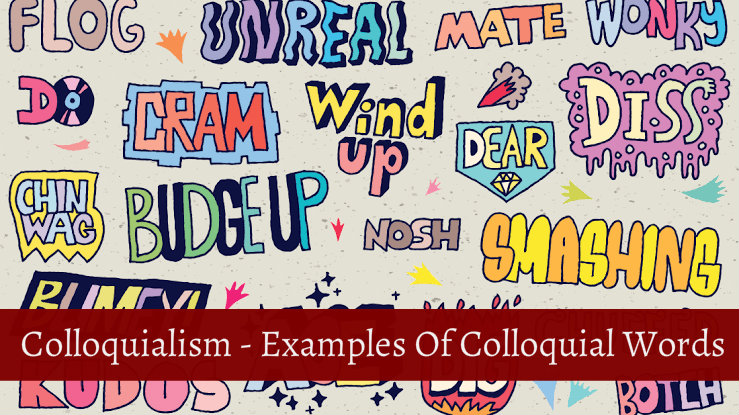English learners, this session you would be learning about the language of Colloquialism with example words and phrases.

What Do You Mean By Colloquialism?
In English grammar, Colloquial refers to the words or phrases which are included in daily speech but they are not part of formal language. Sometimes the English slang words are also included. The sentences that include colloquial words and phrases are considered as statements that are understood easily understood by a specific age group.
The colloquial words and phrases can make the writing more reliable, relatable and believable. It helps to portray characters that sound like actual people. Even though, colloquialism is not appropriate for formal or business writing such as emails, academic documents, business published papers.
10+ Examples of Colloquial Language Words
Here you can learn about some of the unique colloquial words and phrases that generally lend a regional-specific piece of writing which is not have any formal touch.
- Ace – The word is used to describe something excellent
- Anorak – when someone who is a little bit of a geek with expertise usually in an obscure niche
- Blimey – it is an exclamation of surprise
- Bloke – used for a regular man or “guy”
- Boot – It is used to refer to the trunk of a car
- Brilliant – when something that’s really great
- Brolly – used for an umbrella
- Cheeky – the word describes to be overly familiar or bold, sometimes in an endearing way
- Cheers – (also used casually) thank you
- Chinwag -having a chat
- Chockablock – when something that is completely filled
- Chuffed – The words mean to be proud or excited
- Codswallop – It is something made-up or not true
- Dodgy – when something less than safe or secure
- Dog’s dinner -The phrase means a big mess, often used to describe a situation
- Gobsmacked – when you are completely surprised
- Gutted – If something is horribly disappointing
- Knackered – when someone is totally exhausted
- Lurgy – the word refers to an illness with symptoms like a cold or flu
- Pea souper – It is a very foggy day
- Poppycock – When something is ridiculous and possibly untrue
- Posh – It is used to refer something or someone that is very fancy
- Rubbish – Generally an exclamation meaning something is untrue or of poor quality
- Skive – a word used to skip work or school
- Smarmy – it is smug or snobby with a false earnestness
- Strop – it is used to referring bad mood or sulk
- Swot – Word is used when a very serious, possibly geeky, student
- Tosh – something that’s untrue
- Whinge – to whine and complain
- Ballpark – used to describe something that is close to accurate
- Bomb – to do terribly on a test
- Cattywampus – a crooked thing
- Flake – a person who cancels plans regularly or the act of regularly canceling plans
- Lemon – a purchase that is unreliable and has many problems
- Podunk – used to describe a small town
- Raincheck – a promise to reschedule plans that had to be canceled
- Ride shotgun – to sit in the front passenger seat of a car
- Score – to get what you want
- Trash – to destroy something
- Chirping – making fun of or taunting someone
- Click – a kilometer
- Eh or Hey – used at the end of a sentence to signal a check for agreement
- Gong show – an event that gets out of control
- Keener – someone who tries too hard to win favor
- Kerfuffle – a difference of opinion that causes a fuss
- Pencil crayons – colored pencils
- Serviette – a napkin
- Skid – a kid from a poor family
- Toque – a warm cap or beanie, rhymes with “duke”
- Arvo – afternoon
- Bottle-o – a liquor store
- Bludger – a lazy person
- Cobber – a good friend
- Deadset – something that is true
- Flat out – extremely busy
- Furphy – unlikely stories or rumors
- Mongrel – a person who is unkind or troublesome
- Rapt – really pleased
- Swag – a sleeping bag
- Woop – a town in the middle of nowhere
Keep learning new words with EnglishBix!

